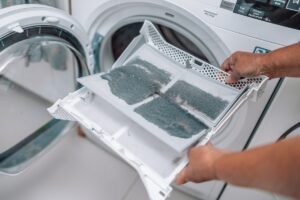9 Home Appliance Maintenance Tips for Longevity
Our home appliances are essential components of our daily lives, making tasks more convenient and efficient. To ensure these appliances function optimally and have a long lifespan, regular maintenance is key. Proper care not only saves you money on repairs but also contributes to energy efficiency and overall household safety. In this guide, we’ll explore seven valuable tips for maintaining your home appliances, helping you extend their longevity, and keep your household running smoothly.

1. Read the Manuals
Every appliance comes with a user manual providing essential information about usage, maintenance, and troubleshooting. Reading these manuals thoroughly can provide valuable insights into the specific needs of each appliance. It includes instructions on cleaning, proper usage, and any preventive measures that need to be taken. Manuals often contain useful tips and tricks specific to your appliance model, helping you make the most out of its features and ensuring you’re aware of any particular maintenance requirements unique to your device.
2. Regular Cleaning
Keeping your appliances clean is important to their longevity. Regularly clean filters, vents, coils, and other parts prone to dust and dirt accumulation. For example, clean the lint filter in your dryer after each use, clear the refrigerator coils at least once a year, and wipe down the rubber gaskets on your washing machine to prevent mold growth. Clean appliances not only work more efficiently but also last longer. Additionally, a clean appliance contributes to a healthier home environment by preventing the buildup of allergens and contaminants.
3. Proper Ventilation
Appliances like refrigerators, dryers, and ovens require adequate ventilation to function correctly. Ensure there’s ample space around these appliances to allow for proper airflow. Blocked vents can cause appliances to overheat, leading to wear and tear. Regularly check and clear any obstructions to maintain optimal ventilation. Proper ventilation not only extends the life of your appliances but also ensures they operate at peak efficiency, reducing energy consumption and lowering your utility bills.
4. Regular Inspections
Periodic inspections can help identify issues before they escalate. Check for signs of wear, loose parts, or unusual noises. For example, inspect your furnace. Is your furnace making noise when off? It probably means there’s a problem with the internal components, such as a malfunctioning fan or a loose belt. You should also inspect the hoses and seals of your washing machine and dishwasher for any signs of leaks.
Addressing small problems promptly can prevent significant malfunctions and extend the appliance’s life. Regular inspections also give you a chance to assess the overall condition of your appliances, allowing you to plan for replacements or upgrades as needed, ensuring your home operates with the latest and most efficient technology available.
5. Use Properly
Follow the manufacturer’s instructions for proper usage. Overloading appliances, using the wrong detergents, or setting incorrect temperatures can cause unnecessary stress on the machinery. Use appliances as intended, and avoid pushing them beyond their capacity. Also, be mindful of not slamming doors or lids, as this can misalign or damage the appliance’s components. Proper usage not only prevents immediate damage but also ensures consistent, reliable performance over the long term, saving you from premature wear and unexpected breakdowns.
6. Schedule Professional Maintenance
For complex appliances like HVAC systems or gas appliances, it’s advisable to schedule regular professional maintenance. Certified technicians can conduct thorough inspections, clean internal components, and make necessary adjustments. Professional maintenance not only ensures longevity but also enhances energy efficiency, saving you money on utility bills in the long run. Additionally, professional technicians can detect potential issues before they become major problems, saving you from costly repairs or replacements. Investing in regular professional maintenance is an investment in the longevity and efficiency of your appliances, ensuring they serve you well for years to come.
7. Address Issues Promptly
If you notice any unusual behavior or malfunction, address the problem promptly. Ignoring small issues can lead to more significant problems, requiring costly repairs or replacements. If you’re not confident in handling repairs, it’s best to call a qualified technician.
Quick action can prevent further damage and prolong the appliance’s life. Prompt attention to issues not only saves you money in the long run but also ensures the safety of your home. Timely repairs prevent potential hazards, such as electrical malfunctions or gas leaks, safeguarding your property and the well-being of your family. Remember, a little vigilance today can prevent major inconveniences tomorrow, allowing you to enjoy the full benefits of your appliances without interruptions.
8. Mindful Energy Consumption
Being mindful of your appliances’ energy consumption is not only essential for their longevity but also for the environment. When replacing old appliances, opt for those with the ENERGY STAR label, indicating their energy efficiency. Additionally, adjust settings according to your usage patterns. For instance, set your thermostat to an energy-saving temperature when you’re away from home, and avoid overfilling your refrigerator, allowing proper air circulation and energy efficiency. Implementing these energy-efficient practices not only extends the life of your appliances but also reduces your overall environmental footprint, contributing significantly to a greener and more sustainable planet.
9. Seasonal Preparations
Proactive measures before each season can significantly enhance the longevity of your appliances. Prior to winter, ensure your heating systems, water heaters, and other temperature-sensitive appliances are in optimal condition. Clean or replace filters to maintain efficient performance, check for leaks, and insulate exposed pipes to prevent freezing during colder months. Similarly, before summer, conduct thorough maintenance tasks. Clean the condenser coils of your refrigerator to ensure optimal cooling efficiency, and make sure your air conditioning units are clean and functioning well. These seasonal preparations serve as protective shields for your appliances, shielding them from the impact of extreme weather conditions.

Conclusion
Maintaining your home appliances through regular care and attention is an investment in their longevity and your peace of mind. By following the tips provided in this guide, you not only save money on costly repairs and replacements but also contribute to a more sustainable environment by ensuring energy efficiency. Remember, a little effort in maintenance today can go a long way in preserving the functionality and durability of your home appliances, making your daily tasks more convenient and worry-free in the years to come.
Frequently Asked Questions (FAQs)
Why is appliance maintenance important?
Regular maintenance ensures your appliances run efficiently, saving you money on energy bills and preventing costly repairs or replacements.
How often should I perform maintenance on my appliances?
The frequency of maintenance depends on the appliance type. However, a general guideline is to check and clean them every 3-6 months.
Can I do appliance maintenance myself, or should I hire a professional?
Many maintenance tasks can be done by homeowners. Still, it’s recommended to consult the appliance manual and consider professional help for complex issues or if you’re unsure.
What are some common signs that my appliances need maintenance?
Look out for unusual noises, decreased performance, leaks, strange odors, or visible wear and tear. These signs often indicate the need for maintenance.
Are there specific maintenance tasks for different appliances?
Yes, each appliance has unique requirements. For example, clean the lint filter in your dryer, descale your coffee maker, and vacuum the coils on your refrigerator.
How can I extend the life of my washing machine and dishwasher?
Use the appropriate detergents, clean filters, and ensure proper loading to prevent overloading. Regularly check for clogs in the hoses and clean the detergent dispenser.
What should I do to maintain my refrigerator?
Clean the coils, check the temperature settings, and inspect the door seals for leaks. Keep the refrigerator organized to allow proper airflow.
Is it necessary to clean my oven regularly?
Yes, cleaning your oven prevents the buildup of grease and food residue, which can affect its efficiency and even lead to fire hazards.
How can I maintain my HVAC system for longevity?
Change the air filters regularly, schedule annual professional inspections, and keep the area around the outdoor unit clean and unobstructed.
What are some safety precautions to keep in mind during appliance maintenance?
Always unplug the appliance before cleaning or performing maintenance tasks. Use caution when dealing with sharp or hot components, and follow safety guidelines in the appliance manual.
